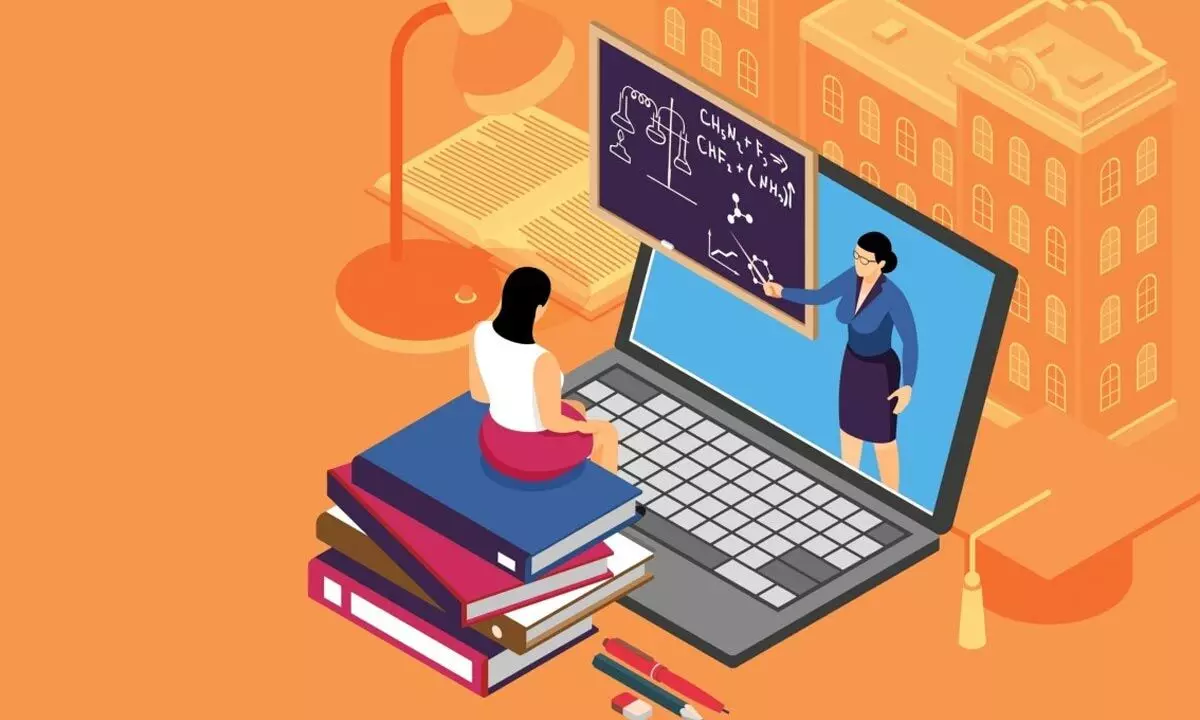Freedom with e-learning unleashing the possibilities of flexible, accessible learning

Online education, or e-learning, is revolutionising the traditional models of providing and receiving education. Distant learning has been available for many years—but with the outbreak of Covid-19,
e-learning’s popularity has shot up, transforming the whole education sector. The idea underlying this new mode of education is to empower students to study from anywhere, without having to travel long distances to attend schools
Psychologists believe that the audio-visual form of e-learning is more effective than other traditional approaches when it comes to engaging students across age-groups; it is not only flexible, but also adaptable to any given learning technique. A recent UNESCO report on education highlighted the importance of emergent technology in the sector, revealing that it holds immense potential to support education across the globe due to its scope for remote learning.
E-learning is a more cost-effective solution than the traditional classroom teaching model, and is able to keep up with the continuous changes needed to maintain quality education. In 2022, the Indian e-learning market was US$ 6.4 billion, but it is likely to reach US$ 14.1 billion by 2028—13.7% CAGR during 2023-2028, says an IMARC report.
In the dynamic and interconnected world we live in today, education has surpassed the limitations of traditional classrooms. The emergence of e-learning has guided in a fresh era of educational opportunities. The novel freedom of e-learning unleashes new possibilities in allowing students to acquire knowledge at their preferred pace, in environments that best suit their needs, and with a diverse array of educational resources.
Deepak Subbarao, Co-founder of Avidii, explains few important aspects of flexibility and accessibility in E-Learning.
Importance of E-Learning
Today, the e-learning system of education is used to gain knowledge through digital technologies and devices. This system encourages a healthy exchange of knowledge in interactive atmospheres, with the sudden shift to e-learning after the pandemic bringing massive advantages to students. The IT Ministry recognizes online learning as an essential teaching tool, as technological advancements have made access to information exponentially higher. Here, we will take a look at how e-learning is impacting the industry.
Interactive Elements
Including interactive elements in online courses motivates learners, keeps them engaged and helps them retain their lessons. Multimedia—a mixture of text, audio, images, video, animation and/or graphics—is used often in online courses to make them more attractive and accessible to students with different learning styles and preferences. Besides this, e-learning platforms also incorporate interactive multimedia elements like videos, quiz, and simulations. When used effectively, multimedia can be made to match the learning goals of individual students, and thus maximise outcomes. Educators can use it to show, explain, or highlight content, as a complement (and not as a replacement) for narration or text. By capturing students’ attention, interest and curiosity, multimedia can make online courses varied, challenging and interactive.
Personalised Learning
The idea of personalised learning has been present for a considerable time, and is now gaining increased attention. The emergence of advanced technologies like artificial intelligence (AI), machine learning (ML), and big data, has enabled educational technology (EdTech) platforms to provide customised learning experiences that cater to each student's specific strengths and weaknesses. This approach enhances engagement by allowing learners to progress at their own pace, in contrast to the conventional and standardised, rigid, classroom-style education
Access to Recorded Lectures and Up-to-Date Content
Unlike classroom teaching, students can access e-learning content as many times as they want to, and this can be very helpful in terms of exam preparation. Online learning allows students to access previous lectures as per their convenience,now able to revisit lessons over and over again.
Additionally, EdTech platforms are able to keep their content constantly updated, so that learners always have access to the latest information.
Overcoming Geographical Barriers
E-learning offers a remarkable breakthrough in overcoming the limitations to education imposed by geographical boundaries. Traditional education systems often have restricted access to quality resources and institutions, as based upon a learner's location. With online education systems, individuals from remote areas, rural communities, or underprivileged regions are now able to access education from top-tier institutions and renowned educators, from their own homes. This freedom empowers learners to pursue their academic interests without being constrained by their physical location.
Conclusion
Post the pandemic, students have taken to the e-learning concept more or less seamlessly. This is because, as compared to the traditional teaching method, online learning has relatively faster delivery access; experts say that the time needed to learn via online lessons is 25%-60% lower than in traditional learning settings. Moreover, online education allows students to create and communicate new ideas, and thus it plays a crucial role in facilitating the development of advanced skills for both students and teachers.














